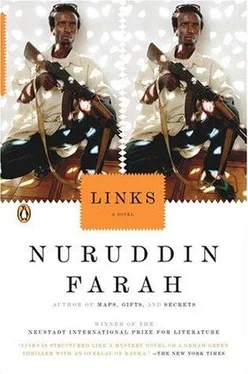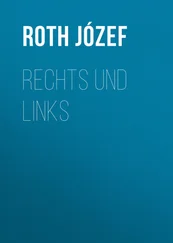Jeebleh remembered how, when he was small, he had tried to stop Caloosha and his friends from molesting a dog. He had been beaten harshly himself for his impudence. (Many years later, he learned that one of the boys had met the fate he deserved: he died from rabies.)
Jeebleh took courage, and found his tongue. He shouted, warning the boy to stop abusing the dog or he would deal with him. At the sound of the raised voice, the guns of the militiamen were trained on him.
He stood up and stormed over to the boy and took him by the scruff of his pampered neck. The boy was so shaken that he choked on his scream, issuing none audibly. “If this spoiled brat disturbs this dog again,” Jeebleh shouted, so everybody could hear, “I’ll become violent and punish him.” The dog looked terribly frightened, and Jeebleh, for his part, felt overwhelmed. But when he snatched the stick from the boy, the dog began to relax. Jeebleh said, “When you hurt the dog, I hurt.”
Now the Alsatian came closer to Jeebleh, and finding her tongue, favored his extended hand with a lick. Jeebleh crouched by the dog, touching her coarse coat, stroking her gently. This provoked a ripple of disapproval across the crowd that had now gathered to watch. Whatever they might think, Jeebleh and the dog looked at each other for a long while, and he discovered her intelligence in the steady confidence in her eyes. Then the dog, racked with birth pangs, went even closer to Jeebleh, who encouraged her to keep pushing. Someone in the crowd commented favorably on his kind gesture: showing mercy to a dog in labor. Someone else said that what he had done was un-Islamic; as a Muslim, he was supposed to avoid coming into physical contact with dogs.
When Jeebleh next looked around, the armed youths were no longer aiming their guns at him. As a matter of fact, they weren’t even there. Perhaps they had sensed that their threatening posture was not acceptable anymore and had slunk away.
He was now in an upbeat mood, and remained close by until the dog, having given birth, bit off the umbilical cords. He admired the compact beauty of the litter: puppies full of stir, half Alsatian, half bush dog, of exquisite grace. He wished someone with a home thereabouts would keep them and look after them. He found a quiet corner for the family, and took off his jacket and covered the puppies with it.
Walking away, he felt good, proud of what he had done, despite the shock on people’s faces. As he moved toward them, a path opened before him, many shunning him because they did not wish to make any physical contact with a man who had touched and been licked by a dog. Customarily, Somalis who came into contact with dogs would cleanse themselves ritually, in obedience to the Islamic code of self-purification. He did not care a sick dog’s snuffle if anyone now shunned bodily contact with him.
As he walked past one knot of bystanders, he heard a whisper: “What manner of man chases away the elders of his clan, and in the same afternoon risks his life to save a bitch?”
The fact that many people had missed out on love because of the continued strife, Jeebleh thought, did not mean that one should stand by and do nothing or allow further cruelty to be meted out to animals or humans.
THE SUN SHONE BRIGHTLY, THE NOON HIGH ON ITS DIAL.
His expression sullen, Jeebleh squinted up at Af-Laawe, who towered above him where he sat. Because Af-Laawe was a friend and an associate of Caloosha’s, Jeebleh didn’t feel he could go to him for help, or share with him his concerns. But now that he was friendless and felt ostracized by the hotel staff — not so much for his kindness to the Alsatian as for his rude sendoff of the clan elders — he was wondering whether to seek out Af-Laawe, obviously a man with a murky history. Maybe things would work out well in the end. As he rose to take Af-Laawe’s hand, Jeebleh proposed a walk in the neighborhood.
“A walk and a talk will do you good,” Af-Laawe agreed.
Conscious of the hostility directed at him from all around, Jeebleh noted that even Bucktooth, the friendliest of the sentries, who had welcomed him with enthusiasm earlier, averted his visibly disturbed gaze. To make a point, though, he greeted Af-Laawe by name. There were rough edges to things, and Jeebleh was more aware of them because of the dirty politics of the place, and this was weighing down on his mind.
He who alienates his clan family is dead, he thought, as he followed Af-Laawe out of his hotel grounds into the derelict streets lined with vandalized buildings. Parting with his clansmen, leaving the hotel — these were as easily done as throwing out a rotten banana when you were well fed. Besides, it was just as well that it had happened the way it did. A confrontation between him and the clan elders over his political loyalties was bound to happen sooner or later, and he was relieved that it had occurred when it had — a few days into his visit. He would move out of the hotel at the first opportunity, and take up Bile’s offer to share the apartment with him for a few days. He had a lot to do: locate his mother’s housekeeper, and make sure that his mother had found peace, that her soul was laid to rest; give a hand in recovering Raasta and her companion from their captors; and recruit Dajaal to exact vengeance on Caloosha.
AF-LAAWE LED JEEBLEH IN THE DIRECTION OF VILLAGGIO ARABO, NAMED FOR the Yemeni community who had formed the majority in the district during his youth. He remembered it as a lively quarter, very cosmopolitan, its alleyways infused with spicy fragrances — the Yemeni kitchen was one of Jeebleh’s favorites. He didn’t need to ask what had become of the community: virtually all, he knew, had fled the city in the earlier weeks of the civil war, when the dust-laden pastoralists recruited into StrongmanNorth’s armed militia turned on them, raping their women and plundering their wealth.
In the streets where Jeebleh and Af-Laawe now walked, minibuses ferrying passengers negotiated their way and almost knocked down pedestrians as they avoided potholes. There were also plenty of Angora goats that may once have belonged to the Yemeni residents, and these were forced to feed on pebbles; there were no shrubs, and the grass and the cacti were dry. The cows Jeebleh saw chewed away at discarded shoes, for which the goats had no stomach. The dogs looked rabid and were so skinny you could see their protruding ribs; they ran off at the slightest hint of threat. There were waste dumps every few hundred meters or so, where vultures, marabous, and the odd crow were having a go at the pickings. Jeebleh felt he had arrived in an area just devastated by wildfire, which had reduced it to spectral ruins, with only the charred sticks of houses remaining.
He tried to express his sense of disbelief to Af-Laawe. “This city is a disaster. I haven’t met anyone who openly approves of what’s happening, and yet the fighting goes on and the clan elders continue soliciting funds for repairing deadly weapons. What’s going on?”
“It’s like a fashion,” Af-Laawe replied. “Every clan family feels that it has to form its own armed militia, because the others have them. The elders, almost all of them illiterate and out of touch with your and my sense of modernity, spend their time trying to raise funds from within the members of the blood community. In truth, it’s all a pose, though, and everybody knows that the elders are doing this to make sure they remain relevant.” Af-Laawe paused, surveyed the devastated street. “Incidentally, I agree with what you did, your refusal to pay for the repair of a battlewagon.”
Jeebleh looked away, at a crow that was being denied access to its fair share of carrion, the smallest of the vultures chasing it away every time it approached. This is a place of grief, he thought, in which even crows starve; in which goats feed on pebbles or clumps of earth, and cows on discarded shoes. What in God’s name was he doing here? He turned to Af-Laawe, silent.
Читать дальше












